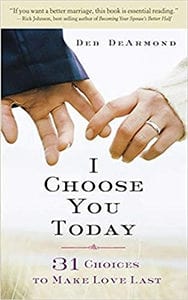Preview:
Deb DeArmond: Love is not a feeling. Uh, it’s, uh, neither is marriage. It’s a choice. One that you have to make every single day even if you have to do it through gritted teeth.
End of Preview
John Fuller: That’s Deb DeArmond, reminding us of what it takes to have a happy, healthy marriage, even when you may be facing some challenges with your spouse. This is Focus on the Family with Jim Daly. I’m John Fuller, and Deb and her husband Ron will be joining us today for our conversation.
Jim Daly: Uh, John, this one’s gonna be a bit of an ouch for me. And Jean, I know you’re listening, so I’m sorry where I didn’t do this well. And the ouch is being more intentional in our marriages. That’s the key, uh, finding we’re gonna talk more about today. And we can’t afford to just coast. And I think some of the husbands too, and I’m sure some wives, we are guilty of that at times. Uh, you know, we just kind of get into the groove and pretty soon we’re raising the kids and making the payments on the house, and it just, you know, it’s just life. It is what it is. But we need to be reminded to be intentional, and make sure our marriages are a priority in our relationship. And that can be tough in this modern world. Uh, we live in a culture that screams the opposite message that marriage is all about making you happy, or fulfilling your needs. And the moment your spouse fails, oh, maybe, uh, you know, I need someone new. That’s how human beings think, even in the Christian community, unfortunately. Um, values like commitment, self-sacrifice, and learning to serve your spouse. I’m sure the hair on somebody’s neck just went up.
John: Mm-hmm.
Jim: Learning to serve your spouse. Are you serious, Jim? Yeah, actually. And I’m guilty of not always doing it that well. Um, we want to address that issue today, so that your marriage can honor the Lord, which should be the ultimate goal. And if you’re looking for help, um, and you wanna improve in this area, hang on for the next 30 minutes.
John: Yeah. And we do have, uh, lots of resources for your marriage here, like our counseling team, if you, uh, need some help and our free marriage assessment. And that online tool can help you and your spouse get on the same page in terms of what’s working well in the relationship and potentially areas where you could improve. Check those out at focusonthefamily.com/broadcast. Our guests today are Ron and Deb DeArmond. Uh, Ron has been a men’s ministry leader for a number of years. And Deb is an author and speaker who has a passion for developing healthy relationships within families. She’s also written a book that really is the foundation for our conversation today. The title is, I Choose You Today.
Jim: And Ron and Deb, welcome back.
Ron: Thank you.
Deb: Thanks.
Ron: It’s great to be back.
Jim: Um, you’ve identified 31 ways that husbands and wives can strengthen their marriage. And we’re gonna cover those today. But explain the book title, I Choose You Today. Let’s start with that.
Deb: Well, Ron actually started it. We were making the bed one morning early in our marriage, maybe year two or three.
Jim: Okay, the fact that you’re making the bed is a good start. (laughs)
Deb: Yeah, it was.
Jim: Together.
Deb: I can’t leave the bedroom usually until it’s made.
Jim: Yeah. (laughs)
Ron: Yeah. That a her…
Deb: Uh, it’s my quirk.
Ron: That’s a her thing.
Deb: It’s a her thing.
Jim: Okay.
Deb: Um, and he looked over the top of the coverlet and said to me, very intentionally, Jim, “Babe, I choose you today.” And I said, “Great. What am I being chosen for?” He said, “I just choose you.”
Jim: That’s good. Did that reaffirm something for you? Did it mean something to you?
Deb: It didn’t in the moment, except that it was some sort of declaration of intentionality. And I thought, maybe I have not been a person who he could choose yesterday. I don’t know.
Jim: Yeah. Well, and you self-described, uh, Ron, that you’re the romantic in your marriage. Now, that’s not always the case.
Ron: No, it isn’t.
Jim: Uh, the shoe’s typically on the other foot. But what are some of those ways that you show that romance?
Ron: Well, as you said in your open, we have this culture, and we have our jobs, and we have our things, so we do have to be intentional. And it really hit me to be intentional about being her husband and loving her in a way that feels natural to me, which was the romantic side. Which meant that, you know, I would surprise her by driving from San Francisco to Southern California, where she was on business, on a weekend where the kids were all taken care of. And walk up to my mother’s house, where she was staying that night and surprise her. But it took intentionality to break the mold and say, “Hey, you’re bigger and better than the job that I have, or the position that I hold.”
Deb: And it was Valentine’s weekend.
Ron: Yeah.
Jim: Yeah.
Deb: So, that really made it.
Jim: That was a good one.
Deb: That was a grand gesture.
Jim: Deb, let me ask you this. Because, uh, you know, so often, opposites attract and it, it’s okay. It’s the way God does these things. And I know there’s couples listening that, you know, you don’t see a great distinction in your spouse and your personality type. And that’s okay too. I’m just saying in general, opposites attract. So, in that context, you’re not being the more romantically inclined to do things like that. How do you step up to the plate? And have you learned that over time? Or do you still struggle not stepping up?
Deb: Well, it’s… I will tell you, it’s still not, uh, sort of the first thing on my mind. Um, he’s tucking notes in my suitcase-
Jim: Aw…
Deb: … to, to open, or leaving notes for me, numbered, while he’s away. And I’m saying to him, “Oh, I forgot to buy you a birthday card. I love you. Happy Birthday.” So, I h-
Jim: (laughing) Uh, this is good.
Deb: I’m a planner. I have a list.
Jim: Yes.
Deb: If it gets on the list, it’s gonna get done. And so, I’ve discovered I have to make myself some notes about those kinds of things.
Jim: Yeah.
Ron: I always ask her with her list, “Am I on your list? Did you put that on,” um, you know.
Jim: Yeah.
Ron: I need to be on there.
Jim: Well, let me ask you this, Ron, because sometimes, um, the romantically inclined to do these special deeds can be offended-
John: Mm-hmm.
Jim: … that they’re not getting reciprocal treatment. And it becomes a point of bitterness. Uh, have you ever dealt with that?
Ron: No. ‘Cause it, it… I knew, I knew (laughs) if the house was on fire, she would know when the firemen came to her desk and say, “Hey, ma’am, you need to leave.”
Jim: (laughs) Right.
Ron: Uh, ’cause she wouldn’t even know. So, I know I have to be intentional about waking that up, and finding different ways to wake that up. And, and I always do. There’s always, the card is always in the visor above her seat in the car. So, when we’re going to a dinner and she, I know first thing she’s gonna do is, what, check the makeup? Well, she’s gonna get hit in the head with a card. And thankfully, they all fall.
Deb: And he is an engineer. This is…
Jim: This is amazing.
Deb: This is way out of bounds. He’s…
Jim: He’s in touch with all his, uh, sides of his heart.
Deb: He’s the, h- He’s the empathy guy.
Jim: Yeah.
Deb: I’m the suck it up, let’s get moving.
Jim: M-
John: But, but, uh, to Jim’s point, there really are some people that will say, “I’ve tried-
Deb: Uh-huh.
John: … and there’s not a reciprocation here, so whatever, I give up.”
Ron: Mm-hmm. No, keep trying.
John: Why?
Jim: That’s good.
Ron: Let’s keep going. Because there is a Holy Spirit that is doing His thing behind the scenes. And so, with my intentionality, there is a Holy Spirit speaking to her about that and being intentional.
Jim: Well, if, if I could be blunt too, I mean, if that’s the motivation, then you got the wrong motivation.
John: Thank you, yes.
Jim: I mean, if you’re looking for the quid pro quo-
Ron: Right.
Jim: … then you gotta go back to the beginning and say, “Okay, why am I doing this? What’s motivating me?” And I love it, Ron, the fact that you just do it out of your heart.
Deb: Yeah. The whole concept of love is not, what can I get from this.
Jim: Right.
Deb: It’s, what do I wanna give to this individual. And even though I’m not the card girl and I’m not the romantic, I did plan one, one really romantic evening where I left a card at work for him. It gave him clues about where to go, and he was gonna find me in a local hotel.
Jim: (laughs) Whoa.
Deb: And we had a babysitter for the kids overnight. (laughs)
Jim: Okay, we’re gonna stop there.
Ron: Okay, this is a family show.
John: Did you find her? (laughs)
Deb: But we had, we had three kids, we had three children, five and under.
Ron: Hmm.
Deb: And it was a little house.
Ron: Yes.
Deb: And so, we just needed some alone time.
Ron: Yeah.
Deb: And that’s like, my one really big shining moment.
Jim: Yeah. You can always point Ron back to that. You remember when? (laughs)
Deb: Oh, yeah, I do.
Ron: She put it in the book on purpose. (laughs)
Deb: I, I did. It’s in the book. But there are other ways that I see myself loving him in practical ways.
Jim: Right.
Deb: Um, when he wanted to change careers and leave something he had been very successful in building a business, and said, “This is my dream.” I said, “Go for it. We’ll make this work.” And that’s not natural for me. I’m a safe player. I like the safe bet. That was my trust, and my support for him, and my love for him. So, it comes out in different ways.
Jim: And that’s good. The, the, uh, ability to listen is another-
Deb: Mm-hmm.
Jim: … aspect of the book. The listening skills. Um, it’s important. A lot of men may struggle with this. I think I’m a pretty good listener, but Jean will tell me tonight after she hears this show. (laughs)
Deb: (laughs) She will.
Jim: And that’s fair. (laughs)
John: But wait, we’ve got her on the phone right now. (laughs)
Jim: Oh, no, she’s hung up. No, I’m kidding. But the, you know, that is a part of it. Stereotypically, men struggle-
John: Mm-hmm.
Jim: … to multitask, to listen. What I’ve tried to do lately is when I really don’t catch her saying something, because I’m looking at something or reading something and she’s caught me at a bad time, to actually stop and look at her and say, “What did you just say? I actually did not hear it.” And she’s good about responding. She doesn’t respond with any kind of, you know, attitude in that regard.
John: Mm-hmm.
Jim: And I think she appreciates the fact that I’m, uh, really interested.
Ron: Right.
Jim: Uh, but what kind of clues have you helped each other with to make sure your listening skills are at the top of their game?
Ron: Well, it’s been her lifelong prayer that God built us with a little red light right here, that said…
Jim: Right between your eyes?
Ron: Yeah, that said, “I’m listening and I’m recording what you’re saying.” So, it can be…
Deb: And if the light’s not flashing, to stop talking. (laughs)
Ron: Yeah, yeah, yeah, yeah.
Jim: Comprehending is the other aspect. You can hear it-
Deb: Yeah.
Jim: … but it doesn’t com- you don’t comprehend it.
Ron: But truly, all jokes aside, it is a thing where you have to stop. You gotta pause the TV. You have to put that thing down. And, and we do it to each other when, when we’re talking and the other one’s looking in a book, we just wait. We just wait, “Oh, okay.” Or the phone, you know. Uh, when she gets, uh… Talking to me and I’m, you know, when something dings on the phone, and she’ll just stop and wait. And it’s like, “Okay, that’s a sign. Where were you? What were you saying?” Yeah.
Deb: I think the other half of that is that we need to remember just ’cause I wanna tell you something right now, doesn’t entitle me to usurp your time in this moment.
John: That’s good.
Jim: Well, that’s a really important fact.
Deb: And so, it may just be-
Jim: Yeah.
Deb: … “Hey, I’d like to talk to you about X, Y, Z. Is this a good time?” And he’s absolutely free to say, “Not really. I’ve got this stuff. I need to get through this email.” “Great, then when’s a better time?”
Jim: Yeah.
Deb: Because if you want it to be meaningful, y- you have to recognize, just ’cause I think it’s time, doesn’t mean it’s time for you.
Jim: (laughs) Well, and that is learned.
Deb: Oh, it is.
Jim: I mean, I think the maturity helps with that. But I can remember, you know, I enjoy watching football on TV. And that’s probably one of my greatest wastes of time. And Jean realized, and she told me, she said, “I know now not to ask you something while you’re watching a football game.” And, uh, her timing, it was always uncanny.
Ron: Yeah.
Jim: It would be right when the score is gonna happen. And, and I couldn’t hear her. And, and she was smart enough to say, “Okay. I’ll ask you at halftime-
Deb: Yeah.
Jim: … or I’ll ask you after the game.” And that’s been a good thing for us.
John: What about the spouse though that says, uh, “The time never comes. I’m unheard.” H- Uh, what are some things that that person can do?
Deb: I think it’s one of the most prevalent problems in marriage. If I had a quarter for every time someone has said, “I talk to him and he says later. You didn’t tell me that. I didn’t know that.” It’s because listening doesn’t happen with your ears. It happens with your heart.
Jim: Mm-hmm.
Deb: And so, what that individual is really saying is, “My heart’s not open to what you have to say.” And that’s a big issue. And that probably requires maybe even some outside help to say, “If there’s not an openness, it’s not important to you that you hear my heart,” we have some big issues to deal with.
Ron: Yeah.
John: Yeah. And, and this is one of those crucial skills, listening.
Deb: Yep.
John: Uh, well, that’s just one of the many insights from Deb DeArmond, who’s in the studio with us today. Uh, she and her husband, Ron, on today’s episode of Focus on the Family with Jim Daly. We’re discussing her book, I Choose You Today: 31 Choices to Make Love Last. And if you’d like to get a copy of this excellent resource, call 800, the letter A, and the word FAMILY, or visit focusonthefamily.com/broadcast. Another resource that we have for you is our free online marriage assessment. It’s really easy to fill out. It’ll give you and your spouse a lot to talk about after you complete it. And you can find our Focus on Marriage Assessment at marriagemilestone.com.
Jim: Let me move to another category which is loyalty.
Deb: Mm-hmm.
Jim: And specifically, loyalty in your marriage. That’s an interesting term, you know. You talk about fidelity in marriage-
Deb: Mm-hmm.
Jim: … and commitment in that way. Loyalty in marriage, uh, it’s rare that you hear that term.
Deb: It’s out of vogue.
Jim: Yeah.
Deb: I hate to tell you. (laughs)
Jim: But you, you know, I love it because you referenced a documentary about a couple and their journey through Alzheimer’s. Uh, describe that. It’s, and it… The thing that catches me here is it’s always that sensational story.
Deb: It is. But…
Jim: But it, but it, it’s so beautiful. Tell us what happened.
Deb: So po- So powerful. Um, two college professors. She, a professor of dance. He was, um, uh, I don’t remember his field, but it was mathematics or something much less defined. Um, and she was diagnosed with early onset Alzheimer’s in her early 50s. And piece by piece, she just disappeared. And eventually, he had to take a leave of absence. And he had to quit the job completely to take care of his wife. He was determined to keep her at home. And I’ll never forget this documentary. It’s, let’s just say, 20 years old. And it’s he and his grown daughter sitting in two folding chairs on a stage. And she’s sobbing and says, “You’ve given your entire life. It’s enough, dad. It’s enough. She doesn’t even know who you are.” And he turned and said to her, “But I haven’t forgotten who she is.”
Jim: Ah.
Deb: That for me, was a m- That was a moment. It even still-
Jim: Yeah.
Deb: … causes a little bit of emotion. The investment is there on his part. She’s benefiting from it, and she’s not even aware of it. Or even-
Jim: Mm-hmm.
Deb: … at that point, she wasn’t even verbal any longer.
Jim: But you know, it speaks to the character-
John: Uh-huh.
Jim: … in our souls. And that’s what is a little scary. Because these stories that we hear, and I did a blog about one-
Deb: Yeah.
Jim: … where a man whose wife had a stroke, could no longer do her hair. And it brought her such joy-
Deb: Yep.
Jim: … to have her hair done. So, he goes to the hairdresser and learns what hair products she used.
Ron: Yeah.
Deb: Yep.
Jim: Bought the brushes, and began to do her hair every day. And you know, people say, “Why would you do that?”
Deb: Yeah.
Jim: Does it really matter? Yes.
Deb: It does. I had two surgeries, heart surgeries which was done in a very short period of time. And he took incredible care of me. He anticipated needs. He didn’t wait for me to think about what I needed. He just took care of me. And I jokingly said, if he ever needs that kinda care from me, he’s gonna die, Jim, because it’s not who I am. But in the moment, it would be there, because we are loyal to one another.
Jim: Yeah. And that’s, that’s what I like about that loyalty component.
Deb: Yeah.
Jim: Is, uh, when the chips are down, who will you be?
Deb: Yeah, absolutely.
Ron: Well…
Jim: In so many ways, that’s where you see who you are.
Ron: Exactly right. It’s reliability. It’s us being… She doesn’t need a doctor. At this point, she needs me, her husband.
Jim: Mm-hmm.
Ron: Not even the pastor or the engineer. It’s being me, you know. And, and sometimes we have a hard time, uh, transitioning out of our job and what we think-
Jim: Yeah.
Ron: … and how we process it. Oh, you need the pastor, right? No. In that loyalty, it’s just, I just need to be her husband and her friend right now. And I just need to take care of her and vice versa.
Jim: Well, and being in tune with it is the biggest concern-
Ron: Yeah.
Jim: … that I’ve got. And I can rationalize as well as anybody else, you know. I, uh, I’m busy. I’m traveling. I’m doing things. And y- you, somehow, you have to arrest all that thinking and stuff it in a box and say, “What’s my primary job here?”
Ron: Yeah.
Deb: An element of loyalty too, is that my very best friend knows all about my life, but I don’t speak to her about my issues with him. That’s not loyalty.
Jim: Mm-hmm, that’s sacred. Yeah, I like that.
Deb: And if I ever complain about him, you know what she says?
Jim: Yeah.
Deb: “And what did Ron say when you brought this up with him?”
Jim: (laughs) That’s good. That’s a good friend.
Deb: Because she’s not g- She’s the best.
Jim: She’s… Yeah.
Deb: She’s not going to have that conversation with me because she recognizes, it’s not healthy.
Jim: Mm-hmm, yeah.
Deb: She said, “I’ll pray with you.”
Jim: Well, I think we’ve touched on that one. Let’s move to another one. Uh, I was intrigued by your chapter called, Choosing to Live in Peace with Your Spouse. (laughs) Let’s all say that together. (laughs)
Deb: Yeah. (laughs)
Jim: Choosing to live in peace with your spouse.
John: With your spouse.
Deb: Yes.
John: Yeah.
Jim: Uh, but I guess that most couples aren’t intentional about choosing peace over conflict. And we get into that, right, as well. It, it’s like, we feed off of the controversy, the conflict. So, what does it look like day-to-day in marriage to live in peace?
Ron: The scripture there, Romans, uh, 12:18, uh, you know, we have the ability to walk in peace, but not always the desire to walk through those things, you know.
Jim: Isn’t that interesting? Man, the word speaks right to a human heart, doesn’t it?
Ron: Yeah, right? So, it is, yeah, I know I have the ability to walk in peace, but it is, it’s getting there. ‘Cause we’re triune beings, spirit-soul bodies, so it’s what’s being stirred right now.
Jim: So, what are the, some of those kind of mistakes, uh, husbands and wives make that lead to the opposite of peace, conflict?
Deb: I think it’s keeping score.
Jim: (laughs) Oh.
Deb: Um, because if I have not had closure, if we’ve not had closure, even if we said, I’m, I’m… (laughs)
Ron: No, you said it right the first time. (laughs)
Jim: Oh, here’s an i- an illustration, okay.
Deb: If, uh… Oh, here we go.
John: Okay, how is he choosing to love her, you know. (laughs)
Ron: You said it right the first time.
Deb: There you go. Um, if there hasn’t been closure, then the next little tiny evidence of that, man, it pops right back up.
Jim: Mm-hmm.
Deb: And we are at it again at full throttle, almost from the word, go.
Jim: Wow. That’s a profound statement. I think a lot of people are, are imagining a lot of unclosed issues in their marriages right now. Uh…
Deb: Uh, we just walk away ’cause we’re tired of fighting.
Jim: Yeah.
Deb: But it’s never really reconciled.
Jim: So, how do you go about resolving this? How do you get to peace?
Ron: It takes a conversation. And I think the biggest thing, we know how to forgive, “Hey, will you forgive me for what I said, the way I handled it?” But one of the clearest questions I need to ask her in that conflict is, how did what I did make you feel? Is there anything that I’ve missed?” Where…
Deb: “What do I need to know?”
Ron: Where she has the opportunity to express-
Jim: Mm-hmm.
Ron: … what was really in her heart when I broke the peace and it caused an emotional reaction.
Jim: Mm-hmm.
Ron: And sometimes it’s, “Well, forgive me for breaking the peace.” But really, it’s, “Is there anything else I missed that you wanna talk about?”
Jim: Uh, the problem with that, it sounds so easy. But for some reason, it’s really hard.
Ron: Yeah.
Jim: I don’t know if…
Deb: Oh, it is hard.
Ron: It’s the hardest thing to do.
Jim: Yeah. I don’t… But it sounds so easy to do-
Ron: Right.
Jim: … if you’re just thinking correctly, thinking straight.
Deb: Well, humility is tough like loyalty.
Jim: So, that’s the problem?
Ron: That’s the challenge, yeah – the challenge.
Deb: And it really is to humble your heart and say, “I wanna understand what the impact was, so that I can avoid doing that. I know you love me, and you don’t want me to feel like that again.”
John: Mm-hmm. So, how long did it take for you to come up with this concept and to grab onto it, and really practice it? I mean…
Deb: 43 years.
Ron: I was gonna say 10 minutes.
Jim: Good. So there’s hope for the…
Deb: Uh, you know, I don’t know that we ever stopped learning-
Jim: Yeah.
Deb: … how to do this better. And I think that when we go, “Okay. Well, we know everything there is to know, we’re done.”
Jim: You tell couples that you can’t be each other’s Holy Spirit.
John: Mm-hmm.
Jim: Okay, that’s the dagger of the program right there, because we do that in marriage.
Ron: Yeah.
Jim: We have expectations. We know you can do better. ‘Cause I do better in that area, you can be doing (laughs) better in that area. And I’m, and in fact trying to be the Holy Spirit in your life. So, speak to that straight and let know why that’s not a good approach.
Ron: Um, there truly is something in, that I know I feel, and especially in money things or things like that, that we’ve agreed on. That when I violate that, I’m feeling something. I’m feeling a prick that this isn’t what we agreed on. And…
Jim: How do you differentiate between not being somebody’s Holy Spirit and getting the point across?
Deb: I think the Holy Spirit really can do a better job than I can.
Jim: (laughs) So, how do we do that? How do we…
Deb: So, I’m gonna pray.
Jim: Okay. Wow.
Deb: I’m gonna, I’m gonna bathe that issue in prayer.
Ron: Can I, can I recite one of my prayers like that?
Deb: Yeah.
Ron: “Oh, God. Oh, God.”
Deb: That’s it, right there.
Ron: “Make her see my point.” (laughs)
Jim: (laughs) Now, are you praying this in front of…
Deb: No.
Ron: Oh, no. No, this is in the…
John: It’s a common prayer.
Jim: This is the car prayer.
Ron: Yeah. This is the car prayer. This is the, our friend is like, “Oh, God.”
John: If only she’ll see.
Jim: Yeah.
Deb: Uh, we can’t shame people into seeing it our way.
Jim: Right.
Deb: And…
Ron: But it is a, a prayer of faith that… And it’s amazing truly. On the way home from work, and that thing, and you walk in the house, and everything’s different. And it’s like, you honored that short heartfelt-
Jim: So, the Lord heard your prayer.
Deb: Yep.
Ron: … prayer of, “I need your help because I can’t do this myself.”
John: Is, is there a time when that’s not an appropriate prayer?
Ron: Not… Between me and Him, it’s never not appropriate.
Jim: Yeah. I was gonna, I jumped on that emotionally, when you said it, I felt it.
Ron: Yeah. Oh, wow.
Jim: It was like, “Hey, how could it never be, right, to pray for somebody?”
Ron: Yeah. It’s always appropriate. Just to get my feelings out and say, “This is frustrating. This is not.”
John: Mm-hmm.
Ron: And this is, and just share my emotion with Him. He’s the God of all comfort.
John: Yeah.
Ron: He’s ready to comfort me in that. But it’s amazing what He does when we get together, that it’s like, “Oh, my gosh.” There’s a peace where we can talk about the tension.
Deb: So, a great example is that, before we were engaged and teens, um, we had curfews from both of our parents. And the night that he led me to the Lord was the night before we graduated from high school. And we were out way past that curfew.
Jim: You were in trouble. You needed God. (laughs)
Deb: We knew it, we knew it.
Ron: Yeah.
Deb: And we both prayed. And when he walked in, his mother was sitting in her rocking chair. And she looked up and said, “Hi, did you have a good evening?” And he said, “I did.” And he said, “And she was done talking. And I went directly to my room.” And it was pretty much the same for me. God honored that-
Ron: Mm-hmm.
Deb: … because we weren’t-
Jim: Yeah, yeah.
Deb: … we weren’t misbehaving. We weren’t being defiant. And God goes before us. Thank goodness.
Jim: Yeah. That’s so true.
Ron: Yeah, that’s, yeah.
Jim: Let’s end here. Um, speaking about that night and what then transformed your lives. You ended up getting married. But Ron, you did something very romantic, very typical for Ron. (laughs) And I say that, actually with applause.
Ron: Well, I…
Jim: But what did you do 38 years later? Because maybe you felt it wasn’t done right the first time.
Ron: Well, and it was. And we, we talked so much when we were engaged. And it was… Well, not even engaged. We would talk so much just in our relationship. And it’s like, “So, and like, do you wanna get married?” and it’s like, “Yeah. I think it’s time we, I think, you know.”
Jim: I mean, you’re teenagers.
Ron: So, that was our proposal. Yeah.
Deb: Yeah.
Ron: We were 18 and going into this. And it’s, and all of a sudden, the proposal was out. It was like, “Oh, uh, okay.” Well then, these are the next… So, so we really never…
Jim: It was really perfunctory.
Ron: Well, except that I had to go talk to her dad, of course.
Jim: Right.
Ron: And, uh, he had just gotten all of his teeth pulled. And so, he, he, he really couldn’t object.
Jim: So, not a good, not good timing. (laughs)
John: So he really couldn’t object.
Ron: Not good tim- No, no. I couldn’t laugh. (laughs)
Jim: Right. (laughs)
Ron: Because I had talked to Mr. Graham many, many times.
John: Mm-hmm.
Ron: But now, he had no teeth. And it was, uh, as soon as I was done talking to him, I said, “We have to go right now. We have to leave.” And she honored that, and we got out of the house. ‘Cause I was, he was… You understand my drift.
Jim: I think I’m going there, yeah.
Ron: It was so hard, but I wanted her hand. Anyway, it was a thing of wanting to give her the surprise.
Jim: So, what did you do? 38 years later, what happened?
Ron: Uh, we were, we were planning a trip to California, all the kids there. And we, uh, I talked to my son who lives there. And he’s in advertising. I said, “We need a photographer to shoot pictures, and find a beach where we can go.” And I mean, set up the whole thing. And I had a new ring for her. And the kids knew about it. Everybody knew about it, except for her. And so, w- uh, they had arranged a shoot, all of the other kids, and then us last. And so, I get right to that point where I’m ready to pose with her. And then I dropped to one knee.
Deb: I thought he was having a stroke-
Jim: (laughs) Oh, man.
Deb: … or a heart attack. I really did. It so startled…
Jim: He went down to one knee.
Deb: It so startled me, it was in the sand.
Ron: She’s, she’s never done that before.
Deb: No, never done that before.
Ron: And so, you know, just that. W- You know, if you had it all to do it over again, would you wanna do it with me?
Deb: He said, “Knowing what the last 38 years has been, would you still say yes? Would you still choose me today?” He said those words.
Ron: Yeah.
Jim: Did you hesitate? (laughs)
Deb: M- I, I, look-
Ron: All of our kids, and…
Deb: … to, to be honest, all the words I understood. I couldn’t put them together to mean something. And I went, “Oh, oh, yeah, yeah, absolutely.” And then he pulled the ring out of his pocket, and then I understood. But when we sat together later, overlooking the Pacific, and I said, “Where did you get this idea?” And he said, “Well,” he said, uh, and when we spoke to that young adults group and they asked, our young marriage group and they asked how he proposed, he told them, “Well, we just started making marriage plans.” He said, “Every girl should have a proposal. And this is yours even if it’s 38 years late.”
Jim: Yeah. It’s so good.
Deb: How can you not love a guy who does that?
Jim: Way to go, Ron. (laughs)
Ron: Thanks. Thank you.
Jim: You did a great job. This has been great.
John: Mm-hmm.
Jim: And, uh, thank you so much for sharing these truths. I mean, I think there are so many sticks of wisdom in this book that you’ve created, I Choose You Today: 31 Choices to Make Love Last. It permeates from every pore of your body. You guys are in love and you have worked to do this. And I think it’s one of the great secrets that shouldn’t be a secret on how to have a wonderful relationship. And that’s to put your life behind the life of your spouse.
Ron: Yeah.
Jim: Put your life down.
Ron: Amen, mm-hmm.
Jim: It’s what scripture says. And it’s so hard for us in our human flesh to do it.
Deb: Mm-hmm.
Jim: And this is a wonderful resource to, uh, rekindle or ignite for the first time this idea of laying your life down for your spouse. I think it’s wonderful. And I want every married couple to get a couple of I Choose You Today. Uh, single adults too, this is a great way to prepare-
John: Mm-hmm.
Jim: … for that life that hopefully the Lord has in front of you, maybe not. But, um, it’s one of those resources you’ll wanna get. And if you can simply make a gift of any amount, uh, to help the ministry here at Focus, to help marriages, to help parents, to do all the work that we do here, we’ll send it along as our way of saying thank you.
John: You can donate and find a variety of helpful resources for your family at our website. Uh, resources like our counseling team. You can arrange for a free over the phone consultation with them. And our free marriage assessment, which is a simple survey you and your spouse can take to figure out what’s working well, and maybe an area or two of growth. And of course, we do have copies of Deb’s book, I Choose You Today. Find out more about all of these resources when you call 800-232-6459 or stop by focusonthefamily.com/broadcast.
Jim: Ron and Deb, again, thank you so much for being here. That transparency, thank you for, uh, helping us be better in our marriages.
Ron: Uh, you’re welcome.
Deb: Thanks for having us.
Ron: It was a joy.
John: And thank you for joining us as well. Now, coming up tomorrow, you’ll hear an inspirational story of an artist who was chosen by God to paint for His glory.
Preview:
Morgan Weistling: It was like God was hitting me on the side of the head with a hammer. And He said, um, “Are you using that talent the way I probably would intend y- uh, have intended for you to use it?”
John: Thanks for joining us today for Focus on the Family with Jim Daly. I’m John Fuller inviting you back as we once again, help you and your family thrive in Christ.
End of Preview




















